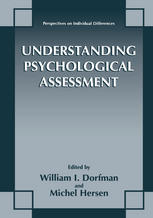

Most ebook files are in PDF format, so you can easily read them using various software such as Foxit Reader or directly on the Google Chrome browser.
Some ebook files are released by publishers in other formats such as .awz, .mobi, .epub, .fb2, etc. You may need to install specific software to read these formats on mobile/PC, such as Calibre.
Please read the tutorial at this link: https://ebookbell.com/faq
We offer FREE conversion to the popular formats you request; however, this may take some time. Therefore, right after payment, please email us, and we will try to provide the service as quickly as possible.
For some exceptional file formats or broken links (if any), please refrain from opening any disputes. Instead, email us first, and we will try to assist within a maximum of 6 hours.
EbookBell Team

4.7
66 reviewsIntroductory texts on psychological testing and evaluation historically are not in short supply. Typically, however, such texts have been relatively superficial in their discussion of clinical material and have focused primarily on the theoretical and psychometric properties of indi vidual tests. More practical, clinically relevant presentations of psychological instruments have been confined to individual volumes with advanced and often very technical information geared to the more sophisticated user. Professors in introductory graduate courses are often forced to adopt several advanced texts to cover the material, at the same time helping students wade through unnecessary technical information in order to provide a basic working knowl edge of each test. Understanding Psychological Assessment is an attempt to address these concerns. It brings together into a single volume a broad sampling of the most respected instruments in the psychologist's armamentarium along with promising new tests of cognitive, vocational, and personality functioning. Additionally, it presents the most updated versions of these tests, all in a practical, clearly written format that covers the development, psychometrics, administra tive considerations, and interpretive hypotheses for each instrument. Clinical case studies allow the reader to apply the interpretive guidelines to real clinical data, thereby reinforcing basic understanding of the instrument and helping to insure that both the student and practi tioner can actually begin to use the test. Understanding Psychological Assessment includes cognitive and personality tests for adults, children, and adolescents, as well as chapters on the theory of psychological measurement and integrated report writing.